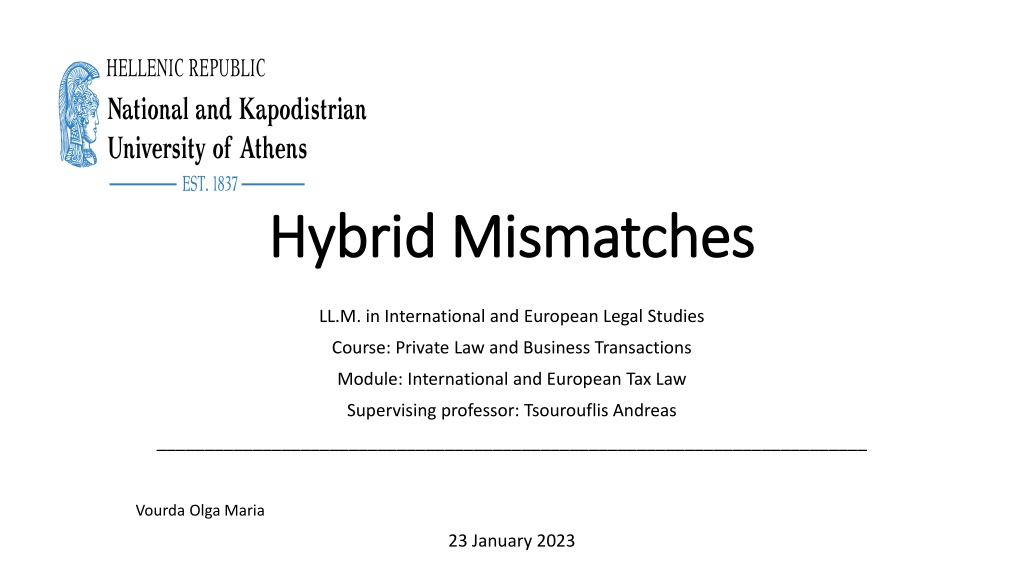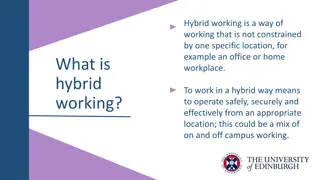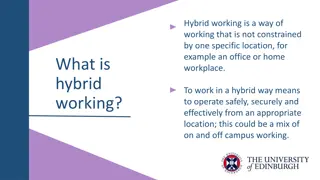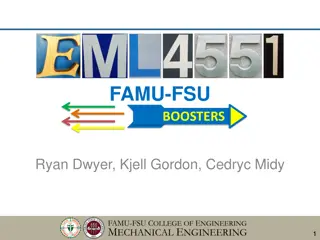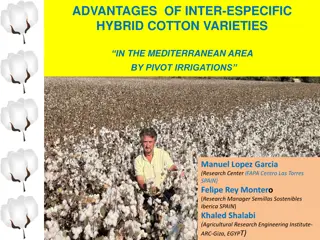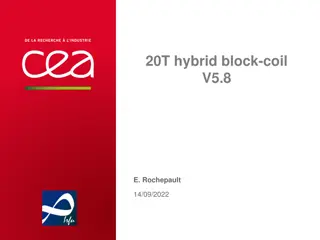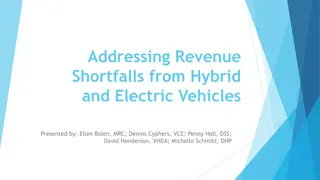Hybrid Mismatches
This course under the module of International and European Tax Law, supervised by Professor Tsourouflis Andreas, delves into the complexities of hybrid mismatches within the realm of private law and business transactions. The study explores the legal intricacies surrounding these mismatches and their implications in an international and European context, providing students with a comprehensive understanding of the subject matter.
Uploaded on Mar 05, 2025 | 0 Views
Download Presentation

Please find below an Image/Link to download the presentation.
The content on the website is provided AS IS for your information and personal use only. It may not be sold, licensed, or shared on other websites without obtaining consent from the author.If you encounter any issues during the download, it is possible that the publisher has removed the file from their server.
You are allowed to download the files provided on this website for personal or commercial use, subject to the condition that they are used lawfully. All files are the property of their respective owners.
The content on the website is provided AS IS for your information and personal use only. It may not be sold, licensed, or shared on other websites without obtaining consent from the author.
E N D
Presentation Transcript
Hybrid Mismatches Hybrid Mismatches LL.M. in International and European Legal Studies Course: Private Law and Business Transactions Module: International and European Tax Law Supervising professor: Tsourouflis Andreas __________________________________________________________________________ Vourda Olga Maria 23 January 2023
Definition Hybrid Mismatch Arrangement exploits a difference in the tax treatment (legal characterization) of instruments, payments or entities under the domestic laws of two or more tax countries to achieve double non taxation or long term tax deferral. Deduction: A deduction occurs when an expense is allowed to be set off against income when calculating the taxable profit of a taxpayer. Therefore, expenses which are not included in the tax calculation do not amount to a deduction. Inclusion: Inclusion occurs when a piece of income is included in the calculation of taxable income. Regarding Hybrid Mismatch inclusion or non-inclusion they must hinge on the characterization of the entity or the transaction. Permanent Establishment (PE): a fixed place of business through which the business of an enterprise is wholly or partly carried on. The term permanent establishment includes especially: a) a place of management, b) a branch, c) an office, d) a factory, e) a workshop and f) a mine, an oil or gas well, a quarry or any other place of extraction of natural resources.
These arrangements can be found under several circumstances These arrangements can be found under several circumstances involving the presence of one of the following involving the presence of one of the following: : Hybrid Instruments Hybrid entities Dual Residence Entities Hybrid Transfer
In terms of the outcome they seek to achieve: In terms of the outcome they seek to achieve: 1. Double Deduction schemes. Arrangements where a deduction related to the same contractual obligation is claimed for income tax purposes in two different countries. 2. Deduction / no inclusion schemes. Arrangements that create a deduction in one country, typically a deduction for interest expenses, but avoid a corresponding inclusion in the taxable income in another country. 3. Foreign tax credit generators. Arrangements that generate foreign tax credits that arguably would otherwise not be available, at least not to the same extent, or not without more corresponding taxable foreign income
Tax policy issues Tax policy issues Tax revenue-Reduction of the overall tax paid by all parties involved, loss of tax revenue. Competition-Business operating cross-border and having access to sophisticated tax expertise may profit Hybrid Mismatch Arrangements, small and medium-sized enterprises don t. Economic efficiency- Cross border investment is more attractive than an equivalent domestic investment, it may potentially contribute to financial instability through increase in leverage from tax-favoured borrowing. (increase of risk taking). Transparency Fairness-available for taxpayers with income from capital rather than labour.
Legislation Legislation 2012: Hybrid Mismatch Arrangements: Tax Policy and Compliance Issues , published in 2012 (Hybrids Report 2012) Base Erosion Profit Shifting Plan Action 2 Anti-Tax Avoidance Directive (EU) 2016/1164 adopted on the 12thof July 2016 and (EU)2017/952 amending directive (EU) 2016/1164 as regards hybrid mismatches with third countries.
Article 9- Hybrid Mismatches 1. To the extent that a hybrid mismatch resulting a double deduction: (a) the deduction shall be denied in the Member State that is the investor jurisdiction; and (b) where the deduction is not denied in the investor jurisdiction, the deduction shall be denied in the Member State that is the payer jurisdiction. Nevertheless, any such deduction shall be eligible to be set off against dual inclusion income whether arising in a current or subsequent tax period. 2. To the extent that a hybrid mismatch results in a deduction without inclusion: (a) The deduction shall be denied in the Member State that is the payer jurisdiction; and (b) where the deduction is not denied in the payer jurisdiction, the amount of the payment that would otherwise give rise to a mismatch outcome shall be included in income in the Member State that is the payee jurisdiction. 3.A Member State shall deny a deduction for any payment by a taxpayer to the extent that such payment directly or indirectly funds deductible expenditure giving rise to a hybrid mismatch through a transaction or series of transactions between associated enterprises or entered into as part of structured arrangement except to the extent that one of the jurisdictions involved in the transaction or series of transactions has made an equivalent adjustment in respect of such hybrid mismatch. 5.To the extent that a hybrid mismatch involves disregarded permanent establishment income which is not subject to tax in the Member State in which the taxpayer is resident for tax purposes, that Member State shall require the taxpayer to include the income that would otherwise be attributed to the disregarded permanent establishment. This applies unless the Member State is required to exempt under a double taxation treaty entered into by the Member State with a third country. 6. To the extent that a hybrid transfer is designed to produce a relief for tax withheld at source on a payment derived from a transferred financial instrument to more than one of the parties involved, the Member State of the taxpayer shall limit the benefit of such relief in proportion to the net taxable income regarding such payment.
EXAMPLES EXAMPLES
Double Deduction Mismatches When a payment, expense or loss is deducted twice because of a qualification or attribution conflict, this is referred to as a hybrid mismatch. a "hybrid mismatch" is any situation in which there are two deductions made: between associated enterprises, between a taxpayer and an associated enterprise, between a head office and a PE, between two or more PEs of the same entity, or under a structured arrangement PE (NON RECOGNIZED- OPAQUE) Co A EXPENSE Third Party Country A Country B
Article 9 ATAD 1. To the extent that a hybrid mismatch results in double deduction: (a) the deduction shall be denied in the Member State that is the investor jurisdiction; and (b) where the deduction is not denied in the investor jurisdiction, the deduction shall be denied in the Member State that is the payer jurisdiction.
Article 9(2) ATAD 2. To the extent what a hybrid mismatch results in a deduction without inclusion: (a) The deduction shall be denied in the Member State that is the payer jurisdiction and (b) where the deduction is not denied in the payer jurisdiction, the amount of the payment that would otherwise give rise to a mismatch outcome shall be included in income in the Member (a) the deduction shall be denied in the Member State that is the payer jurisdiction; and State that is the payee jurisdiction.
Hybrid Transfer Financial asset Taxpayer A Taxpayer B Country A Country B Country A recognizes the sale transaction, State B considers the repurchase a loan.
Article 9(6) ATAD 6. To the extent that a hybrid transfer is designed to produce a relief for tax withheld at source on a payment derived from a transferred financial instrument to more than one of the parties involved, the Member State of the taxpayer shall limit the benefit of such relief in proportion to the net taxable income regarding such payment.
Thank you for your attention!
